

Article show. Fact Checkers. Best Search Instruction Safari. Tools for Teaching. Media Literacy Resources - Julie Smith. National Association for Media Literacy Education. The Basic Definition Media literacy is the ability to ACCESS, ANALYZE, EVALUATE, CREATE, and ACT using all forms of communication.
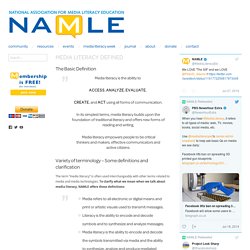
In its simplest terms, media literacy builds upon the foundation of traditional literacy and offers new forms of reading and writing. EdWebet85 - Research with Google. 10 resources to boost student media literacy. Information Evaluation - Always InterestedLibrary & Info Center Fake news. It's complicated. - First Draft News. This article is available also in Deutsch, Español, Français and العربية.
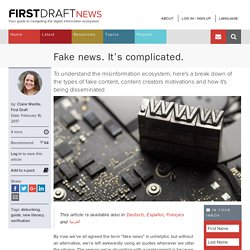
Home - Fake News - LibGuides at Indiana University East. There are four broad categories of fake news, according to media professor Melissa Zimdars of Merrimack College.
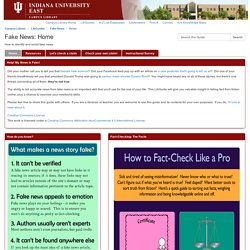
CATEGORY 1: Fake, false, or regularly misleading websites that are shared on Facebook and social media. Log In. Media Literacy- Fake News- Responsible Research. Media Literacy- Fake News- Responsible Research. MLS Resources - Fake News - LibGuides at Massachusetts Library System, Inc. Stony Brook Center for News Literacy. The full News Literacy course, developed at Stony Brook University, organizes the material into 8 concepts that are spread amongst our 14 week course that take students from the first information revolution of Johannes Gutenberg's printing press to the Digital Age of Mark Zuckerberg's Facebook.
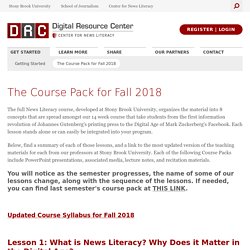
Each lesson stands alone or can easily be integrated into your program. Below, find a summary of each of those lessons, and a link to the most updated version of the teaching materials for each from our professors at Stony Brook University. Each of the following Course Packs include PowerPoint presentations, associated media, lecture notes, and recitation materials.
Fake or Real? - A Fun Google Search Challenge. JSTOR Research Basics: Log in to the site. Hi!
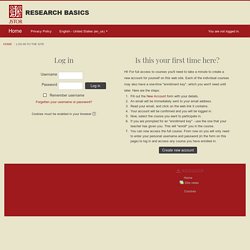
For full access to courses you'll need to take a minute to create a new account for yourself on this web site. Each of the individual courses may also have a one-time "enrollment key", which you won't need until later. Here are the steps: Fill out the New Account form with your details.An email will be immediately sent to your email address.Read your email, and click on the web link it contains.Your account will be confirmed and you will be logged in.Now, select the course you want to participate in.If you are prompted for an "enrollment key" - use the one that your teacher has given you.
This will "enroll" you in the course.You can now access the full course. 9 lessons to boost media literacy. Information Overload - The Google Syndrome. 5 tips to improve your critical thinking - Samantha Agoos. Sheldon Cooper on critical thinking. Daniel Levitin on Information Overload. A critical approach to learning v2June2016. SearchReSearch. List of Internet top-level domains. Wikipedia list article This list of Internet top-level domains (TLD) contains top-level domains, which are those domains in the DNS root zone of the Domain Name System of the Internet.
A list of the top-level domains by the Internet Assigned Numbers Authority (IANA) is maintained at the Root Zone Database.[1] IANA also oversees the approval process for new proposed top-level domains for ICANN. As of April 2021[update], their root domain contains 1502 top-level domains.[2][3] As of March 2021[update], the IANA root database includes 1589 TLDs. YearEndProject2016. How to Evaluate Web Resources. The Internet has given writers in all fields the ability to conduct research more quickly, and more thoroughly, than ever before.
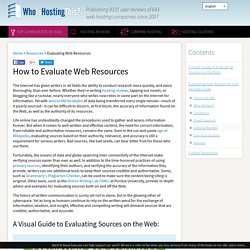
Whether they're writing hosting reviews, tapping out novels, or blogging like a rockstar, nearly everyone who writes now relies in some part on the Internet for information. Search Strategies for Students - Webinar Recording. Stop Plagiarism: Tools to Stop Student Plagiarism. Stop Plagiarism: Tools to Stop Student Plagiarism. Plagiarism.org.
Guide to Preventing Plagiarism. Students, particularly those in college, are expected to adhere to rigorous codes of conduct that stress academic integrity, including prohibitions against plagiarism.
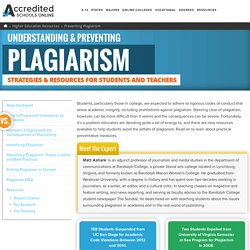
Steering clear of plagiarism, however, can be more difficult than it seems and the consequences can be severe. Fortunately, it’s a problem educators are devoting quite a bit of energy to, and there are new resources available to help students avoid the pitfalls of plagiarism. Read on to learn about practical preventative measures. Library Impact Studies. Info Skills Lessons, Rubrics, Resources. Icon Search Engine. Edwebet43 - Research Process. The five w bookmark. YouTube and Fox News for an evaluation exercise. I’ve been doing an evaluation exercise with many of my English 151 classes for the last couple of years. It works pretty well, and I’ve had several instructors request that I repeat it again for their future classes. Many of my colleagues have been asked about this exercise, so I thought I would put it down it writing.
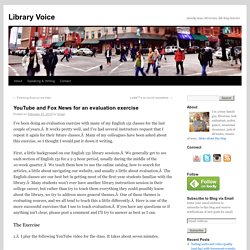
The Exercise 1. I play the following YouTube video for the class. It takes about seven minutes. 2. While the video is playing, I take notes on a whiteboard at the front of the class. Basically I am writing down things the people say in the video that really stick out at me, things that I might want to question. If you listen to the video, you’ll get the idea of the type of things that might raise a flag. Is Content Curation Legal? As we learned with the Lean Startup method, users and prospects feedback play a big role in a startup success.
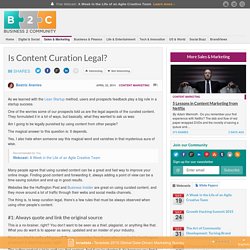
One of the worries some of our prospects told us are the legal aspects of the curated content. They formulated it in a lot of ways, but basically, what they wanted to ask us was: Am I going to be legally punished by using content from other people? The magical answer to this question is: It depends. 10ImportantGoogleSearchStrategiesforStudentsandTeachers.pdf - File Shared from Box. Search Education – Google. S.O.S. for Information Literacy. Power Searching with Google.